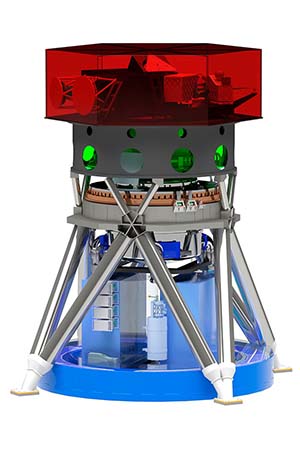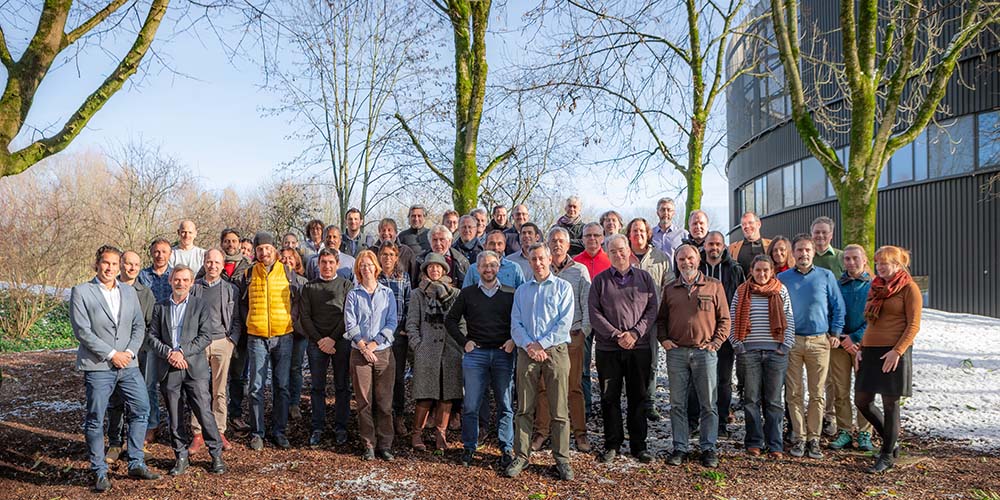ELT MICADO Instrument Passes Preliminary Design Review
MICADO, the first dedicated imaging system for ESO’s Extremely Large Telescope (ELT), has reached an important milestone in its design review. The MICADO consortium, together with a group of external experts from around the world, met at ESO’s Garching headquarters for a week of intense examination of the instrument’s optics, mechanics, software, and electronics, and budget plan to identify any areas which needed further design work. After the meeting, the MICADO team addressed all of the major concerns raised during the review and the instrument has now formally passed its preliminary design review. A more detailed design phase is now underway, leading towards the final design review and construction of the instrument’s many components.

The University of Groningen is a partner in MICADO through the Kapteyn Astronomical Institute, including its OmegaCEN group. The team includes Prof. dr Eline Tolstoy (head of MICADO Science Team and Dutch co-PI), dr Gijs Verdoes Kleijn (lead MICADO Data Flow team), dr Hugo Buddelmeijer, Joost van den Born, dr Willem Jellema, dr Davide Massari and dr Antonino Marasco. The Groningen team, as part of Netherlands Research School for Astronomy (NOVA), closely collaborates with the hardware team at the NOVA Optical Infrared Laboratory. This MICADO hardware team is headed by Ramon Navarro and Annemieke Janssen. The Dutch science plans are developed by the Dutch MICADO Science Team. The Dutch team and efforts are being funded by the Netherlands Research School for Astronomy (NOVA) and NWO.
The ELT will be the largest ever telescope on Earth for optical and near-infrared astronomy. It is being constructed in Chile. Equipped for both imaging and spectrographic observations, MICADO — the Multi-Adaptive Optics Imaging Camera for Deep Observations — will focus on near-infrared imaging and spectroscopy with unprecedented combination of sensitivity and accuracy. To compensate for the blurring effect of the atmosphere MICADO will use two different kinds of adaptive optics systems. One will use the telescope’s deformable M4 mirror to provide sharp images over a narrow field of view; the other uses the full capabilities of the MAORY adaptive optics module to provide a wider field of view.
MICADO will have the flexibility to observe many types of objects and its spectroscopic capabilities will add significantly to our understanding of the composition of these objects. The instrument promises to explore some of the most compelling questions in astronomy, including how exoplanets form, how black holes at the centres of galaxies affect their hosts, and how the Universe has evolved over time.
More information
The MICADO consortium consists of MPE (Max-Planck-Institut für Extraterrestrische Physik, Germany), MPIA (Max-Planck-Institut für Astronomie, Germany), USM (Universitäts-Sternwarte München, Germany), IAG (Institute for Astrophysics of the Georg-August-Universität Göttingen, Germany), NOVA (Netherlands Research School for Astronomy represented by the University of Groningen, the University of Leiden, and the NOVA optical/infrared instrumentation group based at ASTRON in Dwingeloo, The Netherlands), INAF Istituto Nazionale di Astrofisica, CNRS/INSU (Centre National de la Recherche Scientifique/Institut National des Sciences de l’Univers represented by LESIA, GEPI and IPAG, France), A* (an Austrian partnership represented by the University of Vienna, the University of Innsbruck, the University of Linz, and RICAM Linz, Austrian Academy of Sciences, Austria), and the Finnish Centre for Astronomy with ESO (FINCA), University of Turku, Finland.

| Last modified: | 21 April 2020 3.04 p.m. |
More news
-
24 March 2025
UG 28th in World's Most International Universities 2025 rankings
The University of Groningen has been ranked 28th in the World's Most International Universities 2025 by Times Higher Education. With this, the UG leaves behind institutions such as MIT and Harvard. The 28th place marks an increase of five places: in...
-
05 March 2025
Women in Science
The UG celebrates International Women’s Day with a special photo series: Women in Science.
-
16 December 2024
Jouke de Vries: ‘The University will have to be flexible’
2024 was a festive year for the University of Groningen. In this podcast, Jouke de Vries, the chair of the Executive Board, looks back.
